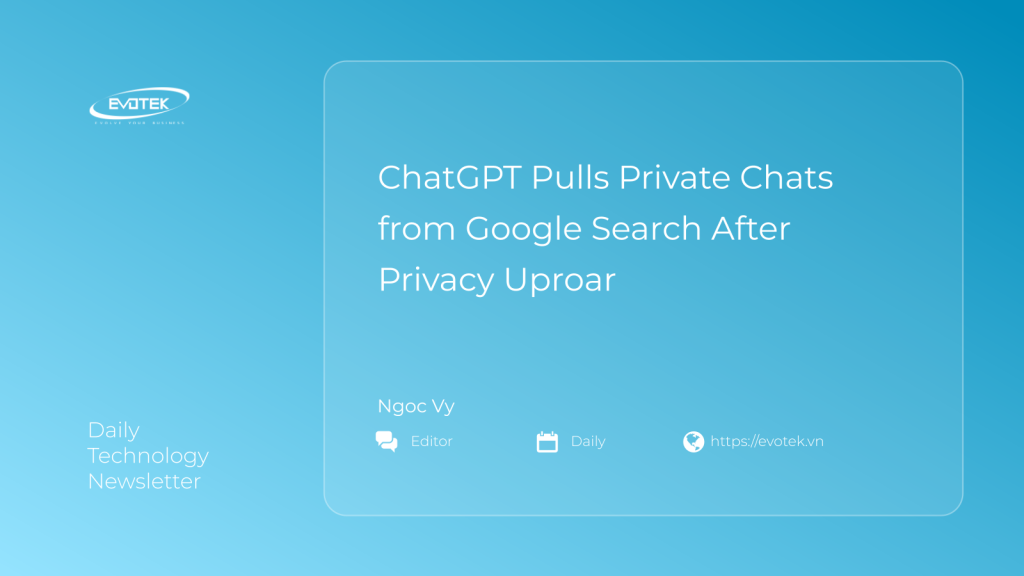OpenAI has officially removed the controversial feature that allowed private ChatGPT conversations to be indexed by Google and other search engines. This decisive action comes after widespread concerns over user privacy, with the company citing “too many opportunities for folks to accidentally share things they didn’t intend to.”
As of August 1st, OpenAI confirmed the complete removal of all previously indexed ChatGPT conversations from Google search results. The “Make Discoverable” checkbox, which once gave users the option to publish their chats, has also been eliminated from the ChatGPT interface. Consequently, a Google search using site:chatgpt.com/share now yields no results, signaling a significant shift in data visibility.
While Google has been cleared, some private chats might still surface on other search engines like Bing and DuckDuckGo, a remnant of the feature’s gradual rollout. OpenAI CISO Dan Stuckey acknowledged this, stating the company is actively working to expunge this indexed content from all relevant search platforms.
“Ultimately, we think this feature introduced too many opportunities for folks to accidentally share things they didn’t intend to, so we’re removing the option,” Stuckey reiterated, emphasizing OpenAI’s commitment to user data protection. An OpenAI spokesperson further clarified that this public indexing capability was merely an “experiment” that has now concluded.
The Privacy Predicament: Unintended Public Exposure
Prior to this update, a surprising number of users inadvertently exposed their private ChatGPT conversations to the public internet. Simple search queries, like site:chatgpt.com/share, revealed a vast repository of highly personal discussions on platforms such as Google, Bing, and DuckDuckGo. These exposed chats ranged from individuals seeking advice on relationship issues and mental health struggles to those exploring unconventional theories. The sheer volume and intimate nature of these publicly accessible dialogues underscored the urgent need for intervention regarding ChatGPT privacy.
The common thread among these leaked conversations was the “Share” button within ChatGPT, a feature launched in May 2023. Intended to simplify sharing conversations beyond cumbersome screenshots, it generated a unique link to specific chats. While these shared links omitted personal names or account details, any explicit mention of unique phrases or names within the conversation itself could make the user identifiable through direct search.
At the heart of the issue was a seemingly innocuous checkbox. When sharing a chat, a small prompt asked, “Make this chat discoverable.” Many users likely assumed this was a mandatory step for sharing, overlooking the finer print that explained it “Allows it to be shown in web searches.” OpenAI’s FAQ stated that conversations would only be indexed if users “manually enable” this option, yet the design led to widespread accidental exposure.
User Responsibility and Legal Ramifications
Google clarified its stance, stating that OpenAI was solely responsible for publishing these conversations to search engines, not the search engines themselves. For users concerned about past exposures, OpenAI provides options to edit or delete shared links, with account deletion also removing associated links.
While some users might be unconcerned about public visibility, perhaps using anonymous accounts, the deeply personal nature of many ChatGPT interactions—often akin to therapy sessions or life coaching, as described by OpenAI CEO Sam Altman—underscores the gravity of this privacy lapse. Furthermore, it’s crucial for users to remember that legally, OpenAI may be compelled to retain and disclose these conversations in legal proceedings, meaning personal chats could potentially be used in court.
AI Chat Privacy: A Recurring Challenge
Ironically, this privacy vulnerability was viewed by some as a “massive SEO goldmine.” One Redditor highlighted how these publicly indexed conversations offered unprecedented insights into audience struggles and “search intent,” providing direct access to the “questions they’re too embarrassed to ask publicly.”
This isn’t an isolated incident for AI chatbots. Meta’s AI faced similar backlash in June when shared conversations appeared in public feeds, prompting an immediate update with a clear warning prompt. Similarly, Google’s own AI, Gemini (formerly Bard), also experienced a period where its chats were indexed by search engines, a phenomenon that has since been rectified.
Beyond the indexing issue, the incident also reignited discussions about the underlying data sources of large language models. Some users have observed uncanny similarities between ChatGPT’s responses and Google search results or Google’s AI Overviews, leading to speculation that AI models like ChatGPT may often act as sophisticated “wrappers” for existing web content, including Google Search and Wikipedia.
This swift action by OpenAI underscores the critical importance of user data privacy in the rapidly evolving landscape of artificial intelligence. As AI chatbots become increasingly integrated into daily life, balancing functionality with robust privacy safeguards remains paramount for user trust and adoption.

 日本語
日本語 한국어
한국어 Tiếng Việt
Tiếng Việt 简体中文
简体中文